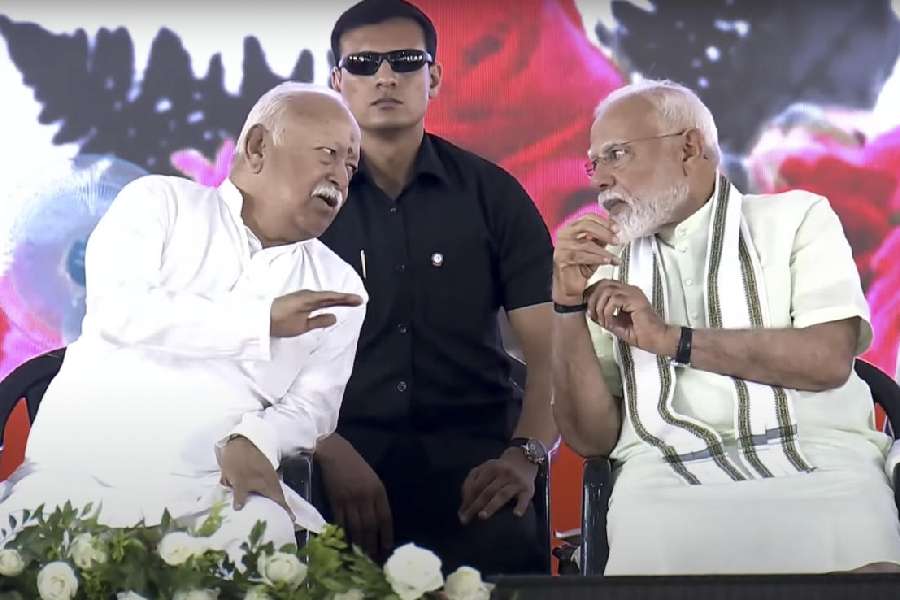Prime Minister Narendra Modi on Sunday described the RSS as the “akshay vat” or eternal protector of India’s “immortal culture”, coddling the Sangh to try and mend bridges with its chief Mohan Bhagwat who sat by his side.
Modi’s first visit to the RSS headquarters in Nagpur during his nearly 11 years as Prime Minister is being seen as an outreach to secure a specific objective: the ideological parent’s sanction for a new BJP president of his choice.
The Prime Minister paid homage at the memorials to Sangh founder Keshav Baliram Hedgewar and the organisation’s second chief, M.S. Golwalkar, describing them as “the two strong pillars ofthe RSS”.
Later, as he and Bhagwat shared a stage to lay the foundation stone for the Sangh-linked Madhav Netralay’s annexe, he again lavished praise on the RSS.
While there was no formal one-to-one meeting between Modi and Bhagwat, sources said they had had a brief conversation on the sidelines of the event. On the stage, the duo were seen talking and laughing.
“Their body language showed all was well. This is probably the first time the two have been seen laughing together on a public stage,” a BJP leader said.
Modi had for most of his tenure as Prime Minister — and as Gujarat chief minister before that — tried to sideline the RSS from his domain of operations. The Sangh, too, had distanced itself, unhappy with what it considered Modi’s attempts at building a personality cult.
The RSS was miffed with the BJP’s hubris-driven slogans of “Modi Ki Guarantee” and “400-plus” seats ahead of last year’s general election, and further offended when BJP chief J.P. Nadda said the party no longer needed any handholding by the Sangh.
Matters came to a head after the BJP suffered setbacks in the election, with Bhagwat appearing to chastise Modi for “arrogance” without naming him, signalling an attempt to regain the whip hand the Sangh once held over the BJP.
The Prime Minister’s unusually placatory approach to the RSS now seems aimed at dissuading it from trying to foist a BJP president of its choice, and underlines how crucial it is for a weakened Modi to have a pliant party chief.
“The thought of national consciousness planted 100 years ago in the form of the Sangh has come up as the great banyan tree,” Modi said in his speech.
“The RSS is the modern akshay vat (literally, the everlasting banyan tree) of India’s immortal culture. This akshay vat is continuously energising Indian culture and our national consciousness.”
Modi went on to say that the RSS was synonymous with “seva” (service).
“The selfless service of the swayamsevaks (RSS cadres) has been evident in times of floods and earthquakes and, most recently, at the Mahakumbh. Wherever there’s a need for service, the Sangh volunteer is there,” the Prime Minister said, bringing a smile to Bhagwat’s face.
Modi has in recent months been going out of his way to curry favour with the RSS.
In late February, he had said the Sangh had inspired lakhs of people like him to live for the country. In an interview with US podcaster Lex Fridman in mid-March, he said the RSS had profoundly influenced his life, instilling a sense of purpose and dedication to the nation.
Modi had last visited the RSS headquarters in 2013, when he was Gujarat chief minister and wanted the Sangh’s support for his anointment as the BJP’s candidate for Prime Minister ahead of the 2014 elections.
Sangh insiders said Modi’s outreach to the Sangh on Sunday was virtually an admission that he and the BJP needed the parent body’s help.
The outcome of the visit will be reflected in the choice of the new BJP president, likely to be appointed in mid-April.
The RSS is learnt to have insisted on a “strong organsational leader” and not a “rubber stamp” for Modi and his second-in-command, Union home minister Amit Shah.
Insiders said the Sangh had not endorsed any of the candidates proposed by the BJP.
Modi also visited Deekshabhoomi in Nagpur, where B.R. Ambedkar had embraced Buddhism with his supporters in 1956, trying to balance his cosseting of the Hindutva fountainhead with a tip of the hat to the architect of the Constitution.










